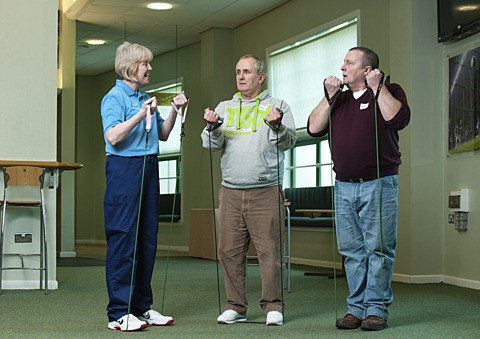Exercise to improve symptoms

Functional Neurological Disorder can present with a wide range of symptoms that can impact your daily life. Exercise can help to improve your general health and fitness, which in turn can improve your general function. In being active and taking part in exercise provides a range of both physical and psychological benefits.
The benefits of exercise
Exercise can improve your strength, balance, body awareness (proprioception) and coordination; making you walk better and making it easier to carry out your normal activities during your day. Psychologically there are also a range of benefits. It can improve depression, anxiety, self esteem and can even improve your social interactions with others if taking part in group activities.
Types of exercise
Due to the varied nature of FND symptoms, your physiotherapist may advise you on specific exercises for certain symptoms such as balance or coordination exercises. For general exercise and physical health, the key is to find a type of exercise you enjoy and that gets your body moving, heart pumping and lungs working. The government recommends 150 minutes of moderate intensity exercise per week, which can be broken down into 30 minute sessions, 5 days per week. This exercise can be achieved from a range of exercise types. Examples include, cycling, running, Pilates, Yoga, exercise classes, gym workouts and resistance machines.
The type of exercise class you do doesn't necessarily need to be FND specific, but should be suitable to your abilities. If you are independently mobile you may manage in general exercise classes such as in gyms and local community centres, if you require a walking aid or wheelchair, a standing or seated workout class may be more suitable to your needs.
If you feel you need more support to get involved in gym based exercise, please see the link below for advice on the Active for Life exercise scheme. Active for life is a council run scheme in the local gyms that cater to arrange of abilities, from seated classes to higher level balance, conditioning classes and gym work.
The type of exercise class you do doesn't necessarily need to be FND specific, but should be suitable to your abilities. If you are independently mobile you may manage in general exercise classes such as in gyms and local community centres, if you require a walking aid or wheelchair, a standing or seated workout class may be more suitable to your needs.
If you feel you need more support to get involved in gym based exercise, please see the link below for advice on the Active for Life exercise scheme. Active for life is a council run scheme in the local gyms that cater to arrange of abilities, from seated classes to higher level balance, conditioning classes and gym work.